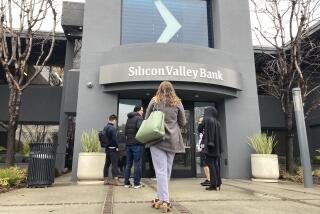Plan to Divert $10 Million to Australia Parent Firm Led to S&L;’s Seizure
LOS ANGELES — The state’s unprecedented seizure last month of profitable Universal Savings Bank in Orange was triggered in part by a series of hand-written notes outlining real estate deals that could have diverted $10 million or more to the S&L;’s ailing parent company in Australia, according to testimony and evidence introduced in Superior Court Tuesday.
And while state regulators said they acted on the belief that the S&L; had committed itself to transferring funds improperly to Sydney-based Unity Corp. Ltd., the judge hearing the case Tuesday voiced concern about the lack of testimony that any such commitment existed.
The notes outlining the loan deals were delivered to the Federal Home Loan Bank Board in San Francisco on June 15 by Christopher Gadsby, who had been ousted as Universal’s vice chairman on June 14.
Two of the deals mentioned in the notes--which suspended Universal Chairman Christopher Blaxland said were stolen from him--involved the possibility of making $10 million worth of loans to Unity Corp.’s chairman.
The state banking commissioner used the notes in his application for a court order that resulted in the state’s seizure of Universal on June 16. It was the first time a healthy, solvent savings and loan association was placed into conservatorship in California.
In testimony Monday, the first day of the hearing on Universal’s suit to overturn the conservatorship, Blaxland and Unity Chairman Garry Carter denied that they had done anything illegal.
Gadsby testified Tuesday that he became alarmed when the notes and draft agreements given to him by a secretary indicated that there would be a “$20-million outflow” from Universal to various borrowers at a time when the S&L; was already at its legal lending limit.
Gadsby testified that Blaxland “realized what the risk was” but told him that “Unity needed the money.”
In interviews Monday, Blaxland and his attorney, Robert K. Wrede, denied any impropriety.
They have been arguing that anything mentioned in the notes that Gadsby turned over to regulators was in the preliminary discussion stage and that no commitments had been made.
In the court order authorizing the state takeover, regulators had alleged that Universal had “committed to the funding . . . without first having the loans reviewed and approved by the loan committee.”
During Tuesday’s testimony, Judge Christian E. Markey Jr. commented that he had become “concerned about events which allowed me to sign” the order to seize Universal. Markey’s concern apparently hinged on the lack of firm evidence that Universal had made a commitment to illegally transfer money to Unity.
Markey had asked former Universal President Serge Woodruff if the S&L; had a commitment to fund the real estate loans detailed in the notes. Woodruff said it appeared to him that Blaxland intended to lend the money but said he was not sure whether Universal was legally committed to the deals.
More to Read
Inside the business of entertainment
The Wide Shot brings you news, analysis and insights on everything from streaming wars to production — and what it all means for the future.
You may occasionally receive promotional content from the Los Angeles Times.










